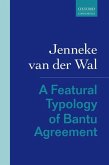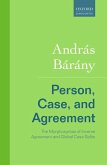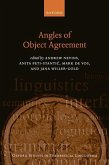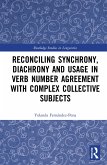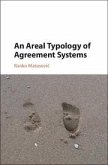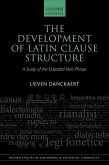Agreement Beyond the Verb
Unusual Targets, Unexpected Domains
Herausgeber: Chumakina, Marina; Kaye, Steven; Bond, Oliver
Agreement Beyond the Verb
Unusual Targets, Unexpected Domains
Herausgeber: Chumakina, Marina; Kaye, Steven; Bond, Oliver
- Gebundenes Buch
- Merkliste
- Auf die Merkliste
- Bewerten Bewerten
- Teilen
- Produkt teilen
- Produkterinnerung
- Produkterinnerung
This book explores unusual patterns of agreement, one of the most intriguing and theoretically challenging aspects of human language. The chapters provide detailed treatments of a wide range of rare and complex agreement phenomena in seven typologically diverse languages.
Andere Kunden interessierten sich auch für
![A Featural Typology of Bantu Agreement A Featural Typology of Bantu Agreement]() Jenneke van der WalA Featural Typology of Bantu Agreement117,99 €
Jenneke van der WalA Featural Typology of Bantu Agreement117,99 €![Person, Case, and Agreement Person, Case, and Agreement]() Andras BaranyPerson, Case, and Agreement145,99 €
Andras BaranyPerson, Case, and Agreement145,99 €![Angles of Object Agreement Angles of Object Agreement]() Angles of Object Agreement128,99 €
Angles of Object Agreement128,99 €![Reconciling Synchrony, Diachrony and Usage in Verb Number Agreement with Complex Collective Subjects Reconciling Synchrony, Diachrony and Usage in Verb Number Agreement with Complex Collective Subjects]() Yolanda Fernández-PenaReconciling Synchrony, Diachrony and Usage in Verb Number Agreement with Complex Collective Subjects202,99 €
Yolanda Fernández-PenaReconciling Synchrony, Diachrony and Usage in Verb Number Agreement with Complex Collective Subjects202,99 €![Agreement and Head Movement: Clitics, Incorporation, and Defective Goals Agreement and Head Movement: Clitics, Incorporation, and Defective Goals]() Ian RobertsAgreement and Head Movement: Clitics, Incorporation, and Defective Goals12,99 €
Ian RobertsAgreement and Head Movement: Clitics, Incorporation, and Defective Goals12,99 €![An Areal Typology of Agreement Systems An Areal Typology of Agreement Systems]() Ranko MatasovicAn Areal Typology of Agreement Systems133,99 €
Ranko MatasovicAn Areal Typology of Agreement Systems133,99 €![The Development of Latin Clause Structure: A Study of the Extended Verb Phrase The Development of Latin Clause Structure: A Study of the Extended Verb Phrase]() Lieven DanckaertThe Development of Latin Clause Structure: A Study of the Extended Verb Phrase134,99 €
Lieven DanckaertThe Development of Latin Clause Structure: A Study of the Extended Verb Phrase134,99 €-
-
-
This book explores unusual patterns of agreement, one of the most intriguing and theoretically challenging aspects of human language. The chapters provide detailed treatments of a wide range of rare and complex agreement phenomena in seven typologically diverse languages.
Produktdetails
- Produktdetails
- Verlag: Sydney University Press
- Seitenzahl: 352
- Erscheinungstermin: 28. Februar 2024
- Englisch
- Abmessung: 224mm x 160mm x 41mm
- Gewicht: 635g
- ISBN-13: 9780192897565
- ISBN-10: 019289756X
- Artikelnr.: 68505769
- Verlag: Sydney University Press
- Seitenzahl: 352
- Erscheinungstermin: 28. Februar 2024
- Englisch
- Abmessung: 224mm x 160mm x 41mm
- Gewicht: 635g
- ISBN-13: 9780192897565
- ISBN-10: 019289756X
- Artikelnr.: 68505769
Marina Chumakina is a Research Fellow in the Surrey Morphology Group, University of Surrey. Her research involves syntax-morphology interface problems viewed from a typological perspective. She has conducted extensive fieldwork on Nakh-Daghestanian languages of the Russian Federation, such as Tsakhur (Lezgic), Bagwalal (Andic), Andi (Andic), and Khwarshi (Tsezic), with a special focus on Archi (Lezgic). She is co-editor of Canonical Morphology and Syntax (OUP, 2012), Periphrasis: The Role of Syntax and Morphology in Paradigms (BA/OUP, 2013), and Archi: Complexities of Agreement in Cross-Theoretical Perspective (OUP, 2016). Oliver Bond is Reader in Linguistics in the Surrey Morphology Group, University of Surrey. His research explores the syntactic and information-structural evidence for the ways that speakers monitor, encode, and interpret reference to discourse participants using agreement and/or case marking in different linguistic systems. His fieldwork has focused on Eleme (Niger-Congo; Nigeria), Nuer (Nilo-Saharan; South Sudan, Ethiopia) and the Tibeto-Burman languages Gurung, Gyalsumdo, Manange, and Nar-Phu, spoken in Manang District, Nepal. He is co-editor of Archi: Complexities of Agreement in Cross-Theoretical Perspective (OUP, 2016), Prominent Internal Possessors (OUP, 2019), and Morphological Perspectives (Edinburgh University Press, 2019). Steven Kaye is a Research Fellow in the Surrey Morphology Group, University of Surrey. He studied Comparative Philology and General Linguistics at the University of Oxford, where his DPhil thesis (2015) examined the development of mixed ('heteroclite') inflection in the Italic and Romance verb. Since 2008 he has also carried out research on languages of the Caucasus, including fieldwork on Northern Talyshi (Indo-European; Azerbaijan), and most recently on Andi (Nakh-Daghestanian; Russia). His research interests include morphological typology, language description, grammaticalization theory, and Indo-European historical linguistics.
* Preface
* 1: Oliver Bond, Marina Chumakina, and Steven Kaye: Unusual agreement
targets in unexpected domains
* 2: Steven Kaye: Agreement between arguments in Andi
* 3: Nina Sumbatova: Agreement of essive adverbials in Tanti Dargwa
* 4: Marina Chumakina: Agreeing adverbs in Enets
* 5: Tania Paciaroni: Unusual agreement targets in Ripano
* 6: Marina Chumakina and Ekaterina Lyutikova: External agreement in
Khwarshi
* 7: Bruno Olsson: Agreeing postpositions and unexpected agreement in
Coastal Marind
* 8: Alexander Rostovtsev-Popiel: Case-shift on Megrelian adverbs
* References
* Index
* 1: Oliver Bond, Marina Chumakina, and Steven Kaye: Unusual agreement
targets in unexpected domains
* 2: Steven Kaye: Agreement between arguments in Andi
* 3: Nina Sumbatova: Agreement of essive adverbials in Tanti Dargwa
* 4: Marina Chumakina: Agreeing adverbs in Enets
* 5: Tania Paciaroni: Unusual agreement targets in Ripano
* 6: Marina Chumakina and Ekaterina Lyutikova: External agreement in
Khwarshi
* 7: Bruno Olsson: Agreeing postpositions and unexpected agreement in
Coastal Marind
* 8: Alexander Rostovtsev-Popiel: Case-shift on Megrelian adverbs
* References
* Index
* Preface
* 1: Oliver Bond, Marina Chumakina, and Steven Kaye: Unusual agreement
targets in unexpected domains
* 2: Steven Kaye: Agreement between arguments in Andi
* 3: Nina Sumbatova: Agreement of essive adverbials in Tanti Dargwa
* 4: Marina Chumakina: Agreeing adverbs in Enets
* 5: Tania Paciaroni: Unusual agreement targets in Ripano
* 6: Marina Chumakina and Ekaterina Lyutikova: External agreement in
Khwarshi
* 7: Bruno Olsson: Agreeing postpositions and unexpected agreement in
Coastal Marind
* 8: Alexander Rostovtsev-Popiel: Case-shift on Megrelian adverbs
* References
* Index
* 1: Oliver Bond, Marina Chumakina, and Steven Kaye: Unusual agreement
targets in unexpected domains
* 2: Steven Kaye: Agreement between arguments in Andi
* 3: Nina Sumbatova: Agreement of essive adverbials in Tanti Dargwa
* 4: Marina Chumakina: Agreeing adverbs in Enets
* 5: Tania Paciaroni: Unusual agreement targets in Ripano
* 6: Marina Chumakina and Ekaterina Lyutikova: External agreement in
Khwarshi
* 7: Bruno Olsson: Agreeing postpositions and unexpected agreement in
Coastal Marind
* 8: Alexander Rostovtsev-Popiel: Case-shift on Megrelian adverbs
* References
* Index


